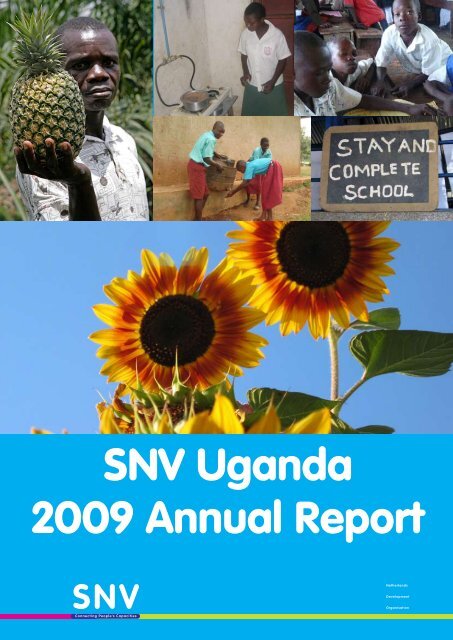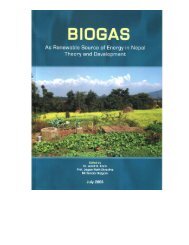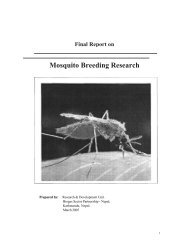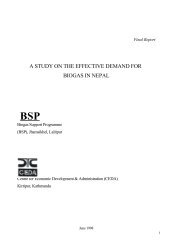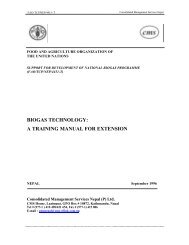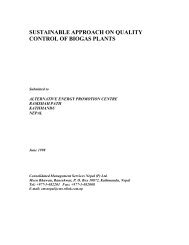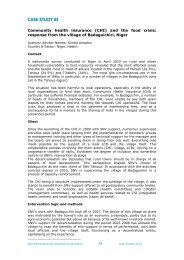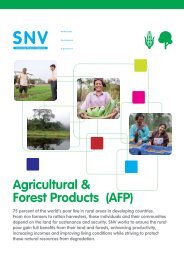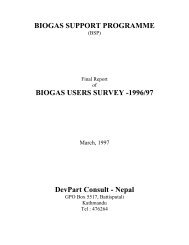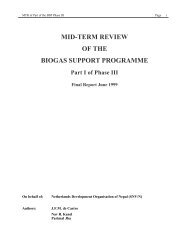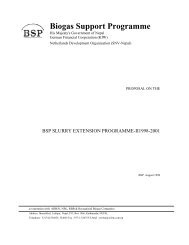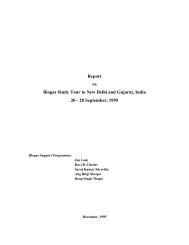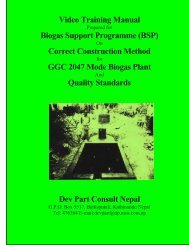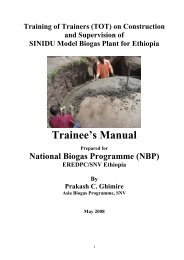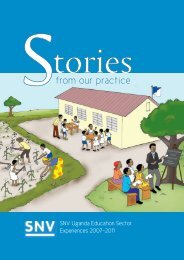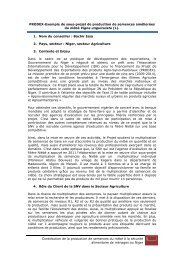SNV Uganda 2009 Annual Report
SNV Uganda 2009 Annual Report
SNV Uganda 2009 Annual Report
You also want an ePaper? Increase the reach of your titles
YUMPU automatically turns print PDFs into web optimized ePapers that Google loves.
<strong>SNV</strong> <strong>Uganda</strong><br />
<strong>2009</strong> <strong>Annual</strong> <strong>Report</strong><br />
1
<strong>SNV</strong> gives you the knowledge and the power to improve what you are<br />
doing.<br />
<strong>SNV</strong> makes you love your work.<br />
This is better than money: the money will get finished very quickly, the<br />
knowledge and power will last always.<br />
Umaru Lubega, Mpigi District
From the Country Director<br />
I am pleased to present you with <strong>SNV</strong>’s annual report for <strong>2009</strong>. It gives an overview of our work,<br />
which is sharing expertise with <strong>Uganda</strong>n partners in finding and implementing sustainable solutions to<br />
development challenges.<br />
Our advisory services support international and <strong>Uganda</strong>n government policies; they are tailor-made for<br />
the specific district or organisation.<br />
Our overall aims are to contribute to:<br />
• effective delivery of good basic services in primary education; water, sanitation and hygiene;<br />
and renewable energy<br />
• sustainable, equitable production, income and employment for the economically active poor,<br />
focusing on oilseed, horticulture, honey and dairy.<br />
We are proud of our results in <strong>2009</strong>. We continue to work with even greater commitment towards the<br />
same goals in 2010. For 2010, we plan for the following:<br />
• increase our involvement in developing knowledge, in collaboration with <strong>Uganda</strong>n universities<br />
and international knowledge institutes like the International Water and Sanitation Centre<br />
(IRC) in the Triple S program —Sustainable Services at Scale.<br />
• start advisory work on developing vocational skills.<br />
• apply <strong>SNV</strong> expertise in <strong>Uganda</strong> borrowed from other countries in the East & Southern Africa<br />
region, especially in renewable energy and dairy.<br />
• increase the number of our advisory days that local capacity builders deliver.<br />
• place gender and ecological sustainability in the mainstream in all our advisory services.<br />
I want to thank you for your collaboration in <strong>2009</strong>, and I hope to meet with you soon, that we may<br />
strengthen our partnership.<br />
For now, I wish you good reading.<br />
Jeanette de Regt<br />
Country Director, <strong>SNV</strong> <strong>Uganda</strong><br />
1
About <strong>SNV</strong><br />
What is <strong>SNV</strong>?<br />
<strong>SNV</strong> is an international development organisation, created as a foundation in the Netherlands in 1963.<br />
We currently work in 32 countries, in Asia, Latin America and the Balkans, but mainly in Africa. <strong>SNV</strong><br />
started working in <strong>Uganda</strong> in 1989.<br />
Our mission<br />
<strong>SNV</strong> is dedicated to a society in which all people enjoy the freedom to pursue their own sustainable<br />
development. We contribute to this by strengthening the capacity of local organisations.<br />
What do we do?<br />
<strong>SNV</strong>’s core business is to provide advisory services. We give advice to national and local actors within<br />
government, civil society and the private sector to help them find and implement local solutions to social<br />
and economic development challenges.<br />
To further increase our relevance, effectiveness and efficiency we complement our advisory services with<br />
three additional delivery channels:<br />
• knowledge brokering<br />
• advocacy<br />
• support to establish funding mechanisms for local capacity development tailored to the needs<br />
of local actors<br />
Our people<br />
<strong>SNV</strong> employs more than 1200 staff worldwide. More than 70% of our advisors and 95% of our support<br />
staff come from countries in which we work. In <strong>Uganda</strong> we employ 42 advisors and 24 support staff.<br />
We work in teams with a diverse mix of professionals with varied expertise, and different cultural<br />
and professional backgrounds. Our advisors combine their thematic knowledge with skills in process<br />
facilitation, organizational development and institutional strengthening.<br />
Ownership and long-term sustainability of development processes are greatly served by strengthening<br />
the rising numbers of local capacity builders. That is why <strong>SNV</strong> advisory services are increasingly delivered<br />
by local capacity builders.<br />
2<br />
Planning for better services to our partners in Rwenzori
<strong>SNV</strong> in <strong>Uganda</strong><br />
In which sectors do we work?<br />
In <strong>Uganda</strong> we focus on<br />
• Primary Education<br />
• Water, Sanitation and Hygiene<br />
• Renewable Energy<br />
• Agriculture: value chain development in Oilseed, Horticulture, Honey and Dairy<br />
• New in 2010: Vocational Skills Development<br />
Good governance principles like accountability, transparency and participation are at the heart of all our<br />
work. ‘Governance for empowerment’ is the concept we use to underscore the value we place on gender<br />
equity and social inclusion of poor and marginalised people as the basis of sustainable development.<br />
Area Districts Sectors Staff (no.)<br />
Central portfolio<br />
Kiboga, Mpigi, Mukono,<br />
Lwuwero, Masaka, Rakai,<br />
Kampala<br />
Renewable energy,<br />
Agriculture,<br />
Education,<br />
WASH<br />
26<br />
North East portfolio<br />
Bukedea. Kapchorwa,<br />
Kumi, Lira, Mbale,<br />
Sironko, Soroti<br />
Agriculture,<br />
Education,<br />
WASH<br />
14<br />
Rwenzori portfolio<br />
Bundibugyo, Kabarole,<br />
Kamwenge, Kasese,<br />
Kyenjonjo<br />
Agriculture,<br />
Education,<br />
WASH<br />
13<br />
West Nile<br />
Adjumani, Arua, Moyo,<br />
Nebbi, Yumbe<br />
Agriculture,<br />
Education,<br />
WASH<br />
13<br />
Our partnerships<br />
We work as much as possible with other local, national and international organisations. Partnerships are<br />
an important way to improve the results of our advisory practice.<br />
We leverage aid provided by the government of the Netherlands, as well as by multilateral and bilateral<br />
partners.<br />
Partnerships with other development agencies and the private sector are key to our approach.<br />
Signing of the <strong>SNV</strong> - World Vision<br />
Education Partnership (<strong>2009</strong> -2012)<br />
3
Education<br />
Portfolio<br />
District governments we<br />
work with<br />
Other partners<br />
Central Kiboga, Mpigi, Rakai Link Community Development, Flora<br />
Family Foundation, Makerere University,<br />
Economic Policy and Research Centre,<br />
Oxford University<br />
North East<br />
Rwenzori<br />
Bukedea, Kapchorwa,<br />
Mbale, Soroti<br />
Bundibugyo, Kabarole,<br />
Kamwenge, Kasese,<br />
Kyenjojo<br />
World Vision International, <strong>Uganda</strong> Wildlife<br />
Authority, IUCN, Islamic University in<br />
<strong>Uganda</strong>, EDUKANS, Kapchorwa Civil<br />
Society Organisation<br />
World Vision, KRC, Save the Children,<br />
Pentecostal and Mountains of the Moon<br />
Universities, The United Nations Children’s<br />
Fund-(UNICEF), Bundibugyo NGO Forum,<br />
KADIVDO, KANCA<br />
West Nile Adjumani, Arua, Yumbe YODEO<br />
National level partners include World Vision <strong>Uganda</strong>, LINK, Embassy of the Kingdom of the Netherlands,<br />
MOES - [Ministry of Education & Sports], EDUKANS, IUCN – [World Conservation Union],<br />
KADIVDO – [Kamwenge District Indigenous Voluntary Organisations], KANCA – [Kabarole NGO and CBO<br />
Association], UNICEF – [United Nations Children’s Fund], YODEO – [Youth Development Organisation]<br />
We have greatly emphasised strengthening the structural systems mandated to deliver education services<br />
and we have worked specifically with district local governments and local civil society organisations to<br />
Group work in a primary school in Soroti<br />
4
ensure that their practices positively affect enrolment, retention and<br />
quality of education services.<br />
“With this knowledge,<br />
my wish is that illiteracy<br />
The <strong>Uganda</strong> Constitution (1995) stipulates education as a right for all stops with me“, SMC<br />
and subscribes to both the Education for All goal and the Millennium member Yumbe<br />
Development Goals. Actually realising these goals, though, is still<br />
uncertain. In many districts access to primary education and the<br />
quality of it are hindered by high pupil and teacher absenteeism,<br />
gender disparity in completing the education, inadequate infrastructure and human resource issues.<br />
Underpinning all these structural challenges are issues of accountability, transparency and efficient use<br />
of resources.<br />
<strong>SNV</strong> <strong>Uganda</strong>’s support to primary education aims to<br />
• increase enrolment and retention, especially of girls, in primary schools<br />
• improve the quality of service provided to promote holistic learning<br />
To achieve these aims, <strong>SNV</strong> initiated forums that brought all major players together to identify issues,<br />
seek solutions, manage them with the aim of improving coordination and collaboration, and ultimately<br />
promote efficiency and transparency.<br />
Throughout the year, a number of districts addressed district-specific issues:<br />
In Mpigi District, parents volunteered to mobilise fellow parents to send children to school and support<br />
them to complete primary 7, while in Kiboga District, functional adult literacy was introduced for parents<br />
so that they would learn to read and write and could then help their children with their homework.<br />
Radio programmes were used to mobilise community support for universal primary education.<br />
Further positive outcomes noted from these meetings<br />
include the favourable environment created for all<br />
parties to harness their roles and responsibilities.<br />
Leaders in districts, sub counties and schools strove to<br />
“<strong>SNV</strong> has shown us the way! Now,<br />
we can take up our responsibility<br />
create innovative strategies to improve service delivery.<br />
to improve the efficiency and<br />
Support to school management committees resulted in effectiveness of primary education<br />
better handling of school affairs. Most have instituted in our district,” District Education<br />
mechanisms for improving school affairs and monitoring<br />
Officer, Kyenjojo District.<br />
pupil learning. In Rakai, 25% of schools now have<br />
school feeding programmes as a result of active school<br />
management committees. In Kyenjojo, teacher and pupil<br />
absenteeism decreased by 50% while in Rwenzori, rates of completing primary school improved from<br />
35.6% in 2007 to 51.5% in 2008.<br />
In Kiboga, the district education officer invites head teachers for peer- to-peer support in charting<br />
improved teaching and management practices for the district. This participatory approach has resulted<br />
in improved management at all education levels in the district. Improved collaboration among head<br />
teachers has improved the sharing of resources and has motivated teachers. By the end of <strong>2009</strong>, Kiboga<br />
registered that 90% of teachers had attended the beginning of the term compared with only 50% at the<br />
beginning of <strong>2009</strong>.<br />
In Bundibugyo, the district education officer met with others to agree on an education road map for the<br />
district, providing a framework for collaboration and investments and stipulating interventions that would<br />
promote education for all.<br />
The accuracy of available data to enable proper planning and decision making continues to be a challenge<br />
5
within the sector. This situation makes it difficult to distribute resources equitably. <strong>SNV</strong> supported district<br />
leadership to improve the way data was collected and used in schools and the districts. A tool for realtime<br />
tracking of pupil and teacher absenteeism to curb wastage in the sector is being piloted in Mbale<br />
and Kiboga districts. Increasing the presence of teachers and pupils in the classroom will improve the<br />
quality of teaching and of learning.<br />
In Kamwenge, a ‘School Is Fun’ project initiated through partnership between <strong>SNV</strong>, the local district<br />
government and Hima Cement aims to promote enrolment by creating a child-friendly school environment<br />
using sports.<br />
‘We would like to do more with subjects like physical education and sports, arts and<br />
crafts, and music but we have no teachers for these subjects because of the teacher<br />
ceiling, and in the end our school is judged on how we perform in the Primary Leaving<br />
Examinations [PLE] subjects.’ Head Teacher Kiboga<br />
In 2010, <strong>SNV</strong> will continue to support existing government programmes while exploring innovative<br />
channels in providing quality education. Focus will be on<br />
• improving accountability and efficiency of service delivery<br />
• addressing equity issues, especially concerning the girl child<br />
• strengthening the voice and participation of communities to increase demand for providing quality<br />
services<br />
Campaign to promote pupil retention in Primary Schools in Eastern <strong>Uganda</strong><br />
6
Water, Sanitation and Hygiene<br />
Portfolio<br />
District local governments<br />
with whom we work<br />
Other partners<br />
Central Kiboga, Mpigi, Rakai Directorate of Water Development, MoWE.<br />
<strong>Uganda</strong> Wildlife Authority, UWASNET<br />
North East<br />
Rwenzori<br />
West Nile<br />
Kapchorwa, Kumi, Mbale,<br />
Soroti<br />
Bundibugyo, Kabarole,<br />
Kamwenge, Kasese, Kyenjojo<br />
Adjumani, Arua, Koboko,<br />
Yumbe<br />
Busiu Development Foundation, Islamic<br />
University in <strong>Uganda</strong>, Sebei Diocese, <strong>Uganda</strong><br />
Wildlife Authority<br />
Kabarole School of Clinical Officers, Health<br />
through Water and Sanitation (HEWASA),<br />
Kasese hand pump mechanics, Kyenjojo hand<br />
pump mechanics, PROTOS, Rwenzori African<br />
Development Foundation (RADF), Sustainable<br />
Sanitation and Water Renewal Systems<br />
(SSWARS), When Rains Fail (WHRAF)<br />
Participatory Rural Development Agency<br />
(PARUDA), Youth Development Organisation<br />
(YODEO)<br />
National level partners include Belgian Technical Cooperation, CARE <strong>Uganda</strong>, IRC-[International Water<br />
and Sanitation Centre], NETWAS <strong>Uganda</strong>- [The Network for Water and Sanitation], PROTOS, UN-<br />
HABITAT [United Nations Human Settlements Programme],<br />
MoWE – [Ministry of Water and Environment of <strong>Uganda</strong>], PARUDA, RADF, UWASNET – [<strong>Uganda</strong> Water and<br />
Sanitation NGO Network], YODEO<br />
7
Fundamental to sustainable development is access to safe water and improved sanitation in schools<br />
and households. <strong>Uganda</strong> currently reports access to safe water at 65% in rural areas and 66% in urban<br />
areas. Enormous efforts have been made to improve rural people’s access to water supplies. However,<br />
the increasing population growth, the rising per capita costs of technologies, the degradation of water<br />
resources, and the continuous use and promotion of conventional technologies hinder significant progress.<br />
Sanitation coverage stands at a national average of only 68% with major disparities in the rural areas.<br />
<strong>SNV</strong>’s support in this sector aims to<br />
• improve functionality of water points by supporting good management and maintenance<br />
• improve planning, accountability, transparency and equitable allocation of resources by promoting<br />
collaboration and coordination<br />
Emphasis was placed on improving hygiene and sanitation practices in communities and primary schools—<br />
especially for the girl child. Absence of toilets and water is an important reason why girls who start<br />
menstruating drop out of school. Learning platforms have been initiated in Arua, Kamwenge, Koboko<br />
and Kyenjojo. At these platforms, experiences are shared and joint action plans undertaken in regard to<br />
policy and practice on hygiene and sanitation in households and schools. This has resulted in<br />
• improved coordination between stakeholders and harmonisation of approaches in districts and sub<br />
counties<br />
• improved hygiene and sanitation practices in schools and communities<br />
• increased participation by various stakeholders including those in the private sector<br />
• improved transparency and accountability as stakeholders freely ask questions regarding expenditure<br />
of resources<br />
To overcome the problems of unstable soils and high groundwater tables, <strong>SNV</strong> promoted ecological<br />
sanitation technology in Kapchorwa, Kiboga, Kumi Mbale, Mpigi, Rakai and Soroti. Ecological sanitation<br />
is a concept of recycling the valuable nutrients contained in human urine and faecal matter back into<br />
agriculture. <strong>SNV</strong> actively promotes this technology through regional exposure visits and district-initiated<br />
learning platforms. Consequently, these efforts have led to improved sanitation facilities in many<br />
schools.<br />
In <strong>2009</strong>, we worked with various partners in these districts to promote efficient and effective practices<br />
and technologies. Rainwater harvesting is one affordable technology that households have adopted.<br />
Koboko Town Council, for instance, constructed two tanks at their offices that benefited 250 people within<br />
the vicinity. Additionally, women working with masons participated in constructing these tanks. By the<br />
end of <strong>2009</strong>, 48 households owned rainwater harvesting tanks.<br />
In 2010, efforts are geared towards improving sector collaboration and coordination at the national<br />
level, as well as continuously supporting government’s national strategy for integrated water resource<br />
management.<br />
8
Renewable energy<br />
A student prepares a meal using a biogas stove<br />
After the biogas stove was introduced, Nalweyiso, a girl child attending nursing aid school, said, ‘I now<br />
prepare breakfast for the family on biogas and it is so fast that we have breakfast early and I no longer<br />
report late to school. I can also do some other household chores while cooking and even allow my siblings<br />
to prepare meals.’<br />
Biogas technology has been in <strong>Uganda</strong> for half a century but has not been widely adopted because of the<br />
high cost of the initial investment and inadequate coordination and collaboration among those involved<br />
in promoting the technology. Even more critical in deterring acceptance is the fact that <strong>Uganda</strong>ns rely<br />
on fuelwood and charcoal for cooking and use kerosene for lighting. Both fuelwood and kerosene are<br />
hazardous as they pollute the environment and aggravate respiratory and eye infections.<br />
In March <strong>2009</strong>, <strong>SNV</strong> <strong>Uganda</strong> under the African Biogas Partnership Programme, in partnership with HIVOS,<br />
Netherlands Directorate General of Development Cooperation (DGIS) and Heifer International, ventured<br />
into promotion of renewable energy. The programme focuses on improving access to and use of clean<br />
renewable sources of energy by<br />
• supporting the development and dissemination of domestic biogas in rural and peri-urban areas<br />
• contributing to the establishment of a sustainable and commercially viable biogas sector in the<br />
country<br />
9
By the end of <strong>2009</strong>, 43 masons had been trained in biogas construction; they then helped at least<br />
42 households gain access to affordable, clean, renewable energy. These trained service providers<br />
constructed 6-m³ size digesters, used mainly for cooking and lighting.<br />
Using domestic biogas cuts down on fuelwood consumption and on the time and effort spent collecting<br />
firewood—a chore done by women and children. As a result, women can now participate in community<br />
programmes, while girl children can spend more time in educational activities. In 2010 we will step up<br />
our efforts, together with partners, to roll out the programme to households in <strong>Uganda</strong> for cooking,<br />
lighting and increase in farm productivity.<br />
Lighting up a house with a biogas lamp<br />
Partners<br />
Heifer International <strong>Uganda</strong><br />
HIVOS- (Humanist Institute for International Development Co-operation)<br />
DGIS - (General Directorate of Development Co-operation)<br />
Ministry of Energy and Mineral Development<br />
10
Agriculture<br />
Some 80% of <strong>Uganda</strong>’s population is dependent on agriculture, making it an important and viable<br />
tool for reducing poverty. <strong>SNV</strong>’s advisory services therefore focus on increased production, income and<br />
employment in the agriculture, livestock, oilseed, beekeeping and horticulture sectors.<br />
In <strong>2009</strong>, working with various farmer groups and other partners, <strong>SNV</strong> realised improvement in<br />
• relationships among producers, processors and other actors<br />
• greater inclusion and participation of farmers in economic affairs<br />
• improved women’s decision-making power at household level<br />
• greater benefits for farmers<br />
• more partnerships for funding and technical assistance.<br />
<strong>SNV</strong> is one of the Dutch NGOs, finance agencies and knowledge institutes united under Agri- ProFocus<br />
(APF) with an aim of enhancing farmer entrepreneurship in <strong>Uganda</strong>. <strong>SNV</strong> coordinates the APF country focus<br />
process in <strong>Uganda</strong> with support from the APF secretariat and Wageningen University. A coordination group<br />
with the team leaders of all action groups complemented by <strong>SNV</strong> <strong>Uganda</strong> and the support organisations<br />
is in place.<br />
Working in partnership with The International Fund for Agricultural Development (IFAD) through the<br />
Strengthening Support Capacity for Enhanced Markets Access and Knowledge Management (SCAPEMA),<br />
<strong>SNV</strong> contributed to<br />
• improved market access through farmer groups using market information systems in 19 rural<br />
information centres.<br />
• knowledge sharing among farmers through exchange visits and policy dialogues<br />
• increased productivity as a result of farmers gaining tips on good farming practices, packaging and<br />
marketing of their produce<br />
Horticulture<br />
Portfolio<br />
Central<br />
Rwenzori<br />
District local governments with<br />
whom we work<br />
Kayunga, Luwero, Masaka, Mityana,<br />
Mubende<br />
Kabarole, Kamwenge, Kasese,<br />
Kyenjojo<br />
Other partners<br />
Luwero District Farmers’ Association,<br />
Centenary Bank<br />
Private Sector Development and Consultancy<br />
Centre (PRICON), Kyembogo Farmers’<br />
Association (KYEFA), KIIMA Foods, The<br />
National Agricultural Advisory Services<br />
(NAADS) program of <strong>Uganda</strong><br />
National partners: Agriterra, Britannia Allied Industries, Danish International Development Assistance<br />
(Danida), the Agriculture Support Programme (ASPS), Technoserve, PUM– [Netherlands senior experts],<br />
SEAF– [Small Enterprise Assistance Funds], UNBS-<strong>Uganda</strong> National Bureau of Standard, KIIMA, NAADS<br />
Within the horticulture value chain, pineapple farming has untapped potential in regional markets with<br />
everyone benefiting, especially the small producers. <strong>SNV</strong> works with pineapple-growing groups to<br />
implement good practices that lead to increased yields and incomes. Our overall focus is on improving<br />
competitiveness of all involved in the value chain. One such initiative is the forum that brings together<br />
stakeholders to address key issues and develop joint action plans on<br />
• good agricultural practices like how to manage wilt disease<br />
• availability of inputs<br />
• access to markets<br />
• adoption of useful new technologies<br />
• policies<br />
11
In <strong>2009</strong>, pineapples within the Rwenzori region<br />
were attacked by pineapple wilt, a disease unknown<br />
to local farmers. This issue was tackled through an<br />
<strong>SNV</strong>-initiated platform that brings together farmers,<br />
researchers, education institutions, businessmen<br />
and government organisations like the National<br />
Agricultural Research Organisation (NARO).<br />
Immediately, researchers were able to take samples<br />
of the affected pineapples, test them and come up<br />
with possible solutions. The wilt remains a challenge.<br />
Efforts are being made nationally to understand it<br />
and to make farm-based trials to contain its spread.<br />
Today, a pineapple production guide stipulating good agricultural<br />
practices has been developed in English and farmers in Rwenzori and<br />
Luwero districts are currently using it. The next step is to translate<br />
this guide into Runyakitara, Luganda and other local languages of pineapple-growing communities.<br />
In 2010, <strong>SNV</strong> commits to further enhance collaboration within this sector by seeking more partnerships<br />
to address sector challenges including the wilt disease, strengthening of producer groups, linking input<br />
suppliers to farmer groups in-order to provide timely and adequate supply of inputs, links to markets and<br />
formation of strong value chains to lobby for favourable policies.<br />
Oilseed<br />
Portfolio<br />
North East<br />
District local governments with<br />
whom we work<br />
Bukedea, Kapchorwa, Kumi, Lira,<br />
Mbale, Soroti<br />
Other partners<br />
Popular Kumi Women’s Initiative,<br />
Vredeseilanden Coopibo (VeCO) <strong>Uganda</strong><br />
Islamic University in <strong>Uganda</strong>, <strong>Uganda</strong><br />
Wildlife Authority, Mukwano<br />
Rwenzori Bundibugyo, Kasese Nyakatonzi Growers Cooperative Union,<br />
Karughe<br />
West Nile<br />
Adjumani, Arua, Moyo, Nebbi,<br />
Yumbe<br />
National partners: <strong>Uganda</strong> Oilseed Producers and Processors Association, VODP-[Vegetable Oil<br />
Development Project], IFAD, VECO, NAADS, Mukwano<br />
In the oilseed sector, <strong>SNV</strong> works within 13 districts to enhance production and marketing. During the last<br />
season in <strong>2009</strong>, the production volume and incomes of oilseed increased by approximately 20%. These<br />
figures confirm the entry of new participants in the sector, from households to donors and private sector<br />
organisations and increased collaboration through the Oilseed Sub-sector Platform.<br />
The Oilseed Sub-sector Platform emerged out of a need identified by oilseed stakeholders,<br />
particularly those in the sunflower value chain, and by <strong>SNV</strong> <strong>Uganda</strong>. The platform comprises<br />
different private and public actors whose common interest is to enhance coordination.<br />
Aware of the need to act with one voice to influence policies and attract public and donor<br />
support, in <strong>2009</strong> the members organised a strategic meeting to advocate coherent sectorspecific<br />
policy and legislation. Three key areas were identified during this event:<br />
12
•<br />
•<br />
•<br />
increase access to adequate quality planting seed<br />
build capacity of farmer groups to bulk<br />
encourage innovative capacity and technological upgrading<br />
The State Minister for the Ministry of Agriculture,<br />
Animal Industries and Fisheries (MAAIF), Mr. Henry<br />
Aggrey Bagiire, who affirmed the importance of this<br />
strategic dialogue, attended the policy dialogue.<br />
“The strategic dialogue organized by OSSUP is a<br />
good opportunity to link public and private sector in<br />
this joint effort and to push the government policy,<br />
Prosperity for All, to greater heights,” he said.<br />
13
Non-timber forest products<br />
Portfolio<br />
North East<br />
Rwenzori<br />
West Nile<br />
District local governments with whom<br />
we work<br />
Bukedea, Kapchorwa, Kumi, Mbale,<br />
Sironko, Soroti<br />
Bundibugyo, Kabarole, Kamwenge,<br />
Kasese, Kyenjojo<br />
Arua, Moyo, Nebbi, Yumbe<br />
Other partners<br />
Mt Elgon Beekeeping, Soroti Diocese<br />
Catholic Integrated, Soroti DLG,<br />
<strong>Uganda</strong> Wildlife Authority, VECO<br />
Kamwenge Beekeepers Cooperative<br />
Society, Kabarole Beekeepers’<br />
Association, BBC, Hives Save Lives<br />
National partners: Ministry of Agriculture, <strong>Uganda</strong> Export Promotion Board, Apitrade Africa, <strong>Uganda</strong><br />
National Apiculture Development Organisation (TUNADO), VECO<br />
Government through its programmes like the Plan for Modernisation of Agriculture and the Zoning<br />
for Agricultural Production Program recognises apiculture as a viable enterprise. Apiculture plays an<br />
important role in food security and biodiversity conservation. Though the sector produces more for<br />
informal domestic markets, <strong>Uganda</strong>’s honey has qualified for access to niche markets like the European<br />
Union.<br />
In apiculture, <strong>SNV</strong> seeks to improve beekeeping practices to achieve sustained production. Such<br />
improvement will lead to access to formal markets and will result in sustained incomes and better<br />
living standards. Our focus remains to improve efficiency by all those involved and will improve sector<br />
coordination and collaboration.<br />
With <strong>SNV</strong> support, hive colonisation rates have improved dramatically, increasing the viability of this<br />
enterprise and attracting financing from private sector organisations like Centenary Bank, Kilimo Trust<br />
and Hives Save Lives.<br />
In Rwenzori, a beekeepers’ competition organised by <strong>SNV</strong> attracted over 200<br />
participants. The event motivated many farmers and attracted private sector players.<br />
It has now become an annual event for mobilising and promoting actors within the<br />
value chain. In Moyo, the Moyo Beekeepers Association has seen its membership grow<br />
to 198 farmers, leading to increased production (8 metric tons) and higher profits.<br />
14<br />
Taking honey to the market
Dairy<br />
Exploring opportunities in the dairy sector<br />
Approximately 2.5 million households in about 42 districts (2007 statistics) lie in the cattle corridor<br />
and rely on livestock farming. Therefore, the government selected dairy as one of the seven priority<br />
subsectors in the Plan for Modernisation of Agriculture.<br />
This sector is however faced with many setbacks like low milk yields, poorly organised farmer organisations,<br />
poor infrastructure, poor industry coordination and lack of an enabling environment.<br />
<strong>SNV</strong> <strong>Uganda</strong> together with other stakeholders including the Dairy Development Authority initiated a<br />
platform to bring all interested parties to dialogue, foster working relations and replicate good practices<br />
from experiences within the region, like the business hub model.<br />
In 2010, opportunities will be explored to link the dairy value chain with the renewable energy and<br />
oilseed value chains. More partnerships, both within civil society and the private sector, will be sought as<br />
we continue to address emerging issues.<br />
15
Financial overview<br />
In <strong>2009</strong>, our operational budget was €3.4 million representing the advisory contribution of our 66<br />
permanent staff and local capacity builders.<br />
<strong>SNV</strong> UGANDA <strong>2009</strong> EXPENDITURE PER SECTOR<br />
17%<br />
26%<br />
13%<br />
13%<br />
23%<br />
5%<br />
2%<br />
1%<br />
PRIMARY EDUCATION 26%<br />
WATER & SANITATION 23%<br />
RENEWABLE ENERGY/BIOGAS 1%<br />
DAIRY 2%<br />
OIL SEEDS 13%<br />
HORTICULTURE 5%<br />
NON TIMBER FOREST PRODUCTS 13%<br />
OTHER 17%<br />
16
<strong>SNV</strong> <strong>Uganda</strong> team<br />
Country Office<br />
Plot 36, Luthuli Rise, Bugolobi<br />
P.O. Box 8339 Kampala, <strong>Uganda</strong><br />
Tel: +256 31 226 0057/8<br />
Fax: +256 31 226 0060<br />
Email: uganda@snvworld.org<br />
www.snvworld.org<br />
Jeanette de Regt, Country Director<br />
Flavia Serebe, Logistics Officer<br />
Cathy Kemigisha, Administrative Assistant<br />
Priscilla Nabanja, Management Assistant<br />
Doreen Kirungi, Human Resource Officer<br />
Apollo Muyanja, Partnership & Resource Mobilisation Advisor<br />
Peninah Kembabazi, Driver<br />
Calvin Mugerwa, Office Attendant<br />
SCAPEMA- IFAD<br />
Prossie V. Musoke, Regional SCAPEMA Representative<br />
Anne Turinayo, Knowledge Management Consultant<br />
Regional team<br />
Reuben M. Coffie, Regional Investment Coordinator<br />
Obuobi Richard, Regional Investment Advisor<br />
Central Portfolio<br />
Plot 32, Luthuli Rise, Bugolobi<br />
Kampala, <strong>Uganda</strong><br />
Tel: +256 41 456 3250<br />
Anne M. Mutta, Portfolio Coordinator<br />
Kees de Graaf, Education Advisor<br />
Ketrah Mukone, Finance & Administration Officer<br />
James Mwai, Agriculture Sector Head<br />
Aldo Hope, Agriculture Sector Advisor<br />
Robert O. Nyambaka, Agriculture Sector Advisor<br />
Patience Turyareeba, Renewable Energy Advisor<br />
Annette Kakwera, Administrative Assistant<br />
Peace Kansiime, Renewable Energy Advisor<br />
Damalie Zalwango, Education Advisor<br />
Helen Mwase, Water, Sanitation & Hygiene (WaSH) Advisor<br />
Ivan Tumuhimbise, Agriculture Sector Advisor<br />
Bernard Eyadu, Water, Sanitation & Hygiene (WaSH) Advisor<br />
Henry K. Kimera, Education Advisor<br />
Eric Agaba, Driver<br />
Daniel Magoma, Driver<br />
Lubega Umaru, Driver<br />
Minsusera Walusimbi, Driver<br />
A. Chemisto Satya, Water, Sanitation & Hygiene (WaSH) Sector Head<br />
Warren Musinguzi, Office Attendant<br />
17
North East Portfolio<br />
Plot 11, Wanale Road<br />
Mbale, <strong>Uganda</strong><br />
Tel: +256 35 226 0050/1<br />
Joseph Semujju, Portfolio Coordinator<br />
Duncan Mwesige, Agriculture Sector Advisor<br />
Susan Karungi, Education Advisor<br />
Annette Kawooya-Bogere, Agriculture Sector Advisor<br />
Esther Byakika, Finance & Administration Officer<br />
Edward Kamoga, Agriculture Sector Advisor<br />
Peter O. Okaje, Agriculture Sector Advisor<br />
Wilbrord Turimaso, Water, Sanitation & Hygiene (WaSH) Advisor<br />
Milton Wataba, Driver<br />
Samuel Ekuma, Driver<br />
Arthur Mbuusi, Driver<br />
Samuel Musinguzi, Finance & Administration Officer<br />
Els Heijnen-Maathuis, Education Sector Head<br />
Deborah Nabirye, Office Attendant<br />
Rwenzori Portfolio<br />
Kakiiza Road<br />
P.O. Box 78, Fort Portal<br />
Tel: +256 75 820 0778, +256 48 342 2777<br />
Fax: +256 31 226 0060<br />
Felix Kazahura, Portfolio Coordinator<br />
Marieke van Schie, Agriculture Sector Advisor<br />
Dick Bangizi, Education Advisor<br />
Jacinta N. Nekesa, Water, Sanitation & Hygiene (WaSH) Advisor<br />
Edward Makobore, Agriculture Sector Advisor<br />
Lucy Musana, Finance & Administration Officer<br />
Godfrey Wabwire, Education Advisor<br />
David Kasaija, Driver<br />
Stephen Kisembo, Driver<br />
Hannington Ssebaduka, Agriculture Sector Advisor<br />
Paschal Isingoma, Driver<br />
Lillian Nabasirye, Water, Sanitation & Hygiene (WaSH) Advisor<br />
Mary Nyangoma Amooti, Office Attendant<br />
Stella Tugume, Administrative Assistant<br />
18
West Nile Portfolio<br />
Plot 2, Ociba Lane<br />
Arua, <strong>Uganda</strong><br />
Tel: +256 47 642 0623, +256 77 220 0781<br />
Gregory Acar, Portfolio Coordinator<br />
P. Ssonko Kivumbi, Education Advisor<br />
Susan Atai, Administrative Assistant<br />
Rashidah Kulanyi, Water, Sanitation & Hygiene (WaSH) Advisor<br />
Brecht.A. Mommen, Water, Sanitation & Hygiene (WaSH) Advisor<br />
Anthony Agaba, Agriculture Sector Advisor<br />
D. Sengozi Kyeyune, Agriculture Sector Advisor<br />
Joseph Akol, Education Advisor<br />
Solomon Oyo, Finance & Administration Officer<br />
Andrew Opila, Driver<br />
Charles Chandiga, Driver<br />
James Amoru, Driver<br />
Zakariah Kasirye, Education Advisor<br />
Christine Bako, Office Attendant<br />
19
The <strong>Uganda</strong> Districts where we are working<br />
YUMBE<br />
Arua<br />
ARUA<br />
Ora<br />
NEBBI<br />
MOYO<br />
Albert Nile<br />
ADJUMA N I<br />
Victoria Nile<br />
Kitgum<br />
Aringo<br />
K ITGUM<br />
Acuwa<br />
Page<br />
LIRA<br />
Agago<br />
(Moroto<br />
OkokDopeth<br />
Oker<br />
Lake<br />
Edward<br />
Semliki<br />
Kasese<br />
Fort<br />
Portal<br />
BUNDIBUGYO<br />
KASESE<br />
L. George<br />
Kazinga<br />
Channel<br />
KABAROLE<br />
KYENJOJO<br />
KAMWENGE<br />
Lake Albert<br />
Nkusi<br />
Masaka<br />
Kafu<br />
KIBOGA<br />
Katon g a<br />
MPIGI<br />
MASAKA<br />
Lugo<br />
Lake<br />
Kwania<br />
LUWERO<br />
Bombo<br />
Kampala<br />
WAKISO<br />
Victoria Nil e<br />
MUKONO<br />
L. Bisina<br />
SOROTI<br />
Lake Kyoga<br />
SIRONKO<br />
KUMI<br />
KAPCHORWA<br />
PALLISA<br />
Mbale<br />
MBALE<br />
RAKAI<br />
S e s e Is.<br />
KALANGALA<br />
Lake Victor i a<br />
20
List Of Abbreviations<br />
BTC<br />
CABCS<br />
DANIDA/ASPS<br />
DLG<br />
FORUD<br />
HEWASA<br />
HIVOS<br />
IRC<br />
IUCN<br />
JESE<br />
KABECOS<br />
KADIVDO<br />
KANCA<br />
KFEWPA<br />
KRC<br />
KYEFA<br />
KYEFA<br />
MoWE<br />
NAADS<br />
NARO<br />
NETWAS<br />
NGCU<br />
PARUDA<br />
PLE<br />
PRICON<br />
RADF<br />
SATNET<br />
SEAF<br />
SSS<br />
SSWARS<br />
TUNADO<br />
UNBS<br />
UNHABITAT<br />
UNICEF<br />
UWASNET<br />
VECO<br />
VODP<br />
WASH<br />
WHRAF<br />
YODEO<br />
Belgian technical cooperation<br />
Community Agribusiness Capacity Services<br />
Danish International Development Assistance/the Agriculture Support Programme<br />
District Local Government<br />
Foundation for Rural Development<br />
Health through water and sanitation<br />
Humanist Institute for Development Cooperation<br />
International Water and Sanitation Centre<br />
World Conservation Union<br />
Joint Effort to Save the Environment<br />
Kamwenge Beekeepers Cooperative Society<br />
Kamwenge District Volunteer Development Organisation<br />
Kabarole NGOs/CBOs Association<br />
Kyempara Farmers Environment and Wildlife<br />
Kabarole Research Center<br />
Kyembogo Farmers Association<br />
Kyembogo Farmers Association<br />
Ministry of Water and Environment of <strong>Uganda</strong><br />
National Agricultural Advisory Services<br />
National Agricultural Research Organisation<br />
The Network for Water and Sanitation<br />
Nyakatonzi Growers Cooperative Union Ltd<br />
Participatory Rural Development Agency<br />
Primary Leaving Examinations<br />
Private Sector Development and Consultancy Centre<br />
Rwenzori African development foundation<br />
Sustainable Agriculture Trainers Network<br />
Small Enterprise Assistance Funds<br />
Triple S program —Sustainable Services at Scale<br />
Sustainable Sanitation and Water Renewal Systems<br />
<strong>Uganda</strong> National Apiculture development Organization<br />
<strong>Uganda</strong> National Bureau of Standard<br />
United Nations Human Settlements Programme<br />
United Nations Children’s Fund,<br />
<strong>Uganda</strong> Water and Sanitation NGO Network<br />
Vredeseilanden Coopibo<br />
Vegetable Oil Development Project<br />
Water, Sanitation and Hygiene<br />
When Rains Fail<br />
Youth Development Organisation
22<br />
www.snvworld.org


